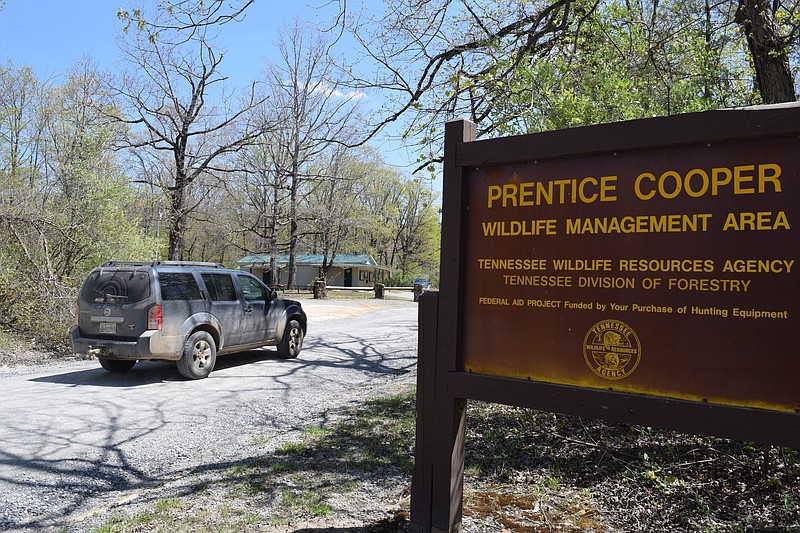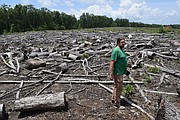The state of Tennessee sold the timber on 133 acres of land last week in Prentice Cooper State Forest in Marion County, and a local conservation group says that's a bad idea that reduces biodiversity and wildlife habitat.
"We've been seeing how in the last five years how so much of this south end is getting logged, and this is continuing to be a significant issue," Davis Mounger, founder of the Tennessee Heartwood nonprofit group that seeks to protect forests, said last week.
Mounger recently visited some of Prentice Cooper's past and current timber sale sites near the southern tip of the forest and videotaped what he saw there as he commented. The winning bid was just more than $145,000.
"This area has been pretty much cleared out. Nearby here on the south end are four of the six cuts that will be occurring in 2021," Mounger said. He visited several previous timber sale sites in 2020, including some at Prentice Cooper that he said demonstrated poor logging techniques that do little to regenerate desired species.
"We're concerned with clear-cutting anytime lowering biodiversity. You're getting a lot of things like poplar and scrub coming up in what was originally a mixed hardwood stand with some pines," Mounger said.
(READ MORE: White oak poaching on increase amid rising popularity of Tennessee, Kentucky spirits)
Seed trees left on many sites are often weak and some so damaged from logging activities "they don't seem particularly viable as a seed source," he said. Planned logging activities "are really going to compound these effects on the overall landscape. We're very concerned in particular about how the landscape is changing on the south end of Prentice Cooper."
State officials said logging is part of ongoing forest management that uses sustainable practices with long-range goals of increasing the overall quality of the state's forests.
The 133 acres of Prentice Cooper forest land to be logged consist of six sale parcels ranging in size from 13 to 34 acres, according to state bid documents. Prentice Cooper comprises almost 25,000 acres.
The Tennessee Division of Forestry manages state forests for recreation, wildlife, sporting and other uses, including timbering, and the timber sale area in Prentice Cooper is less than 1% of its land area, said Tim Phelps, the division's communications and outreach unit leader.
The timber stands consist of mature trees and over-mature trees - meaning 80 years old or older - "and the goal is to regenerate the sites to keep the forests growing and more resilient by diversifying the age of the forest," Phelps said.
The division of forestry is mandated under state law to manage state forest lands for a variety of uses and "to provide a sustained yield of high-quality timber and other forest products," according to the division's 2020 harvest plan.
The division estimates there are 1.75 billion board feet of commercial timber in state forests with an estimated value of $266 million.
"This valuable asset is managed on receipts from timber sales," the plan states about operational funding. "No state-appropriated funding is used in the management of the state forest system."
That means Tennessee's state forest management must pay for itself.
The coronavirus pandemic is blamed for timber sales in 2020 falling short of the $3.2 million target, according to a State Forest Timber Sales Summary for 2020, although sales "performed well overall."
Tennessee's timber sales generated almost $2.5 million in revenue in 2020. The summary states there were 13 sales totaling 437 acres in Natchez Trace State Forest - 52% of all the sales in the state for the year - generating more than $1 million or 39% of all the revenue timber sales generated in 2020. The average price per 1,000 board feet for Natchez Trace timber was $259.
Prentice Cooper, meanwhile, had one 14-acre sale that generated around $225,000. That's 9% of the year's revenue, but records show Prentice Cooper had the most valuable timber among the six state forests with an average price per 1,000 board feet of $461.
The other four state forests in the 2020 summary performed somewhere within that range.
Forestry officials point to the certification the state got in June 2020 from the Sustainable Forest Initiative as proof of its successful management practices. The state plans to perform audits to maintain the certification and make sure sustainable practices stay on track.
The vast majority of Prentice Cooper's oak and hickory forest is considered mature, or more than 80 years old, and state officials argue "the forest is progressively getting older as harvesting is below the annual growth rate," Phelps said.
According to an assessment, more than 42% of Prentice Cooper's forest is 80 years old or older while another 38% is 61-80 years old. At the extremes, just over 1% of the forest is younger than 20 years while just over 3% of the forest is 101-120 years old.
Management of state forests aims to maintain the health and productivity of the forest for benefits it provides such as high-quality wood, clean and abundant water, thriving wildlife and recreational uses, but doesn't strongly seek to preserve the forest in as-is condition.
Phelps said other state lands offer more of the approach environmentalists such as Mounger seek.
"Other natural resource agencies, such as state parks and natural areas, offer a preservation ethic where nature is allowed to take a successional course to older forest communities," Phelps said. "Tennessee residents and visitors are fortunate to have public lands managed under both conservation and preservation ethics."
Mounger said the state can employ preservation ideals to all its forests. He contends recent logging is leaving behind more problems than improvements, and those results beg questions about whether the state could do more with a few changes.
Contact Ben Benton at bbenton@timesfreepress.com or 423-757-6569. Follow him on Twitter @BenBenton or at www.facebook.com/benbenton1.

